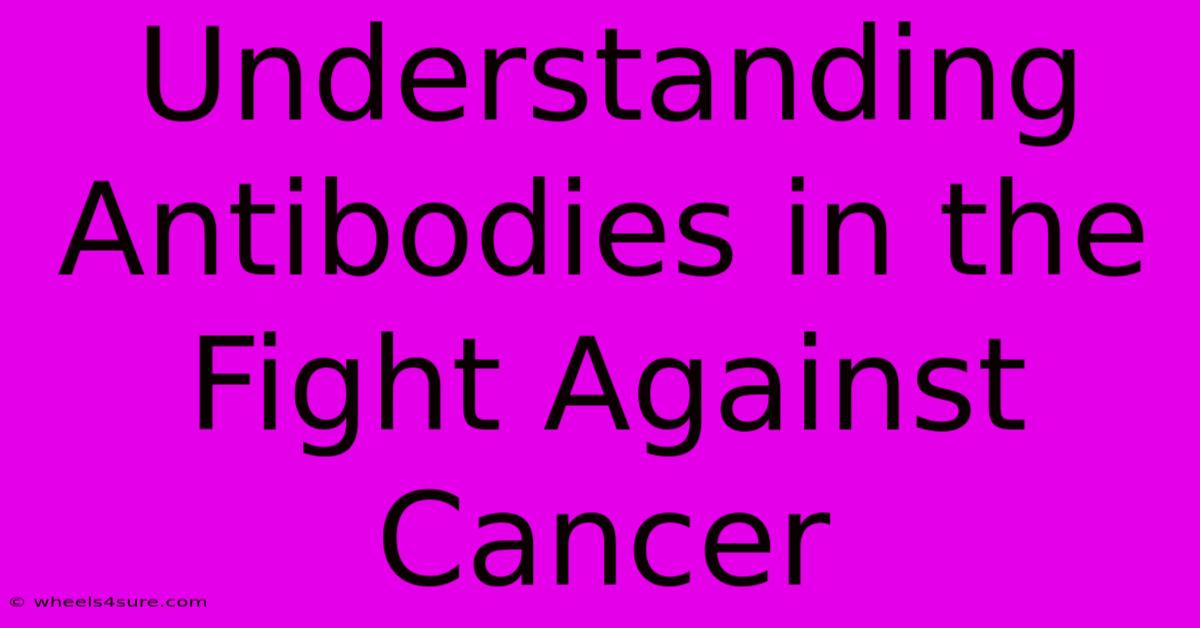Understanding Antibodies In The Fight Against Cancer

Table of Contents
Understanding Antibodies in the Fight Against Cancer
Cancer, a complex disease characterized by uncontrolled cell growth, has long been a formidable foe in the battle for human health. While numerous treatment strategies exist, immunotherapy, particularly utilizing antibodies, has emerged as a powerful weapon in our arsenal. Understanding how antibodies work in the fight against cancer is crucial for appreciating the advancements and potential future directions of this field.
What are Antibodies?
Antibodies, also known as immunoglobulins (Ig), are Y-shaped proteins produced by the body's immune system, specifically by plasma cells (a type of white blood cell). Their primary function is to identify and neutralize foreign substances, known as antigens, including bacteria, viruses, and, importantly, cancer cells. Each antibody possesses a unique binding site that precisely recognizes a specific antigen. This lock-and-key mechanism is central to their effectiveness.
The Structure and Function of Antibodies
Antibodies have a complex structure, but their key feature is the variable region, which determines antigen specificity. This region's variability allows the immune system to produce a vast repertoire of antibodies capable of targeting a wide range of antigens. When an antibody binds to an antigen on a cancer cell, it triggers several mechanisms:
- Direct cell killing: Some antibodies, upon binding, directly trigger the death of the cancer cell.
- Immune cell recruitment: Antibodies can act as markers, attracting other immune cells (like macrophages and natural killer cells) to destroy the targeted cancer cell. This process is known as antibody-dependent cell-mediated cytotoxicity (ADCC).
- Complement activation: Antibodies can initiate the complement system, a cascade of proteins that leads to cell lysis (destruction).
Antibodies in Cancer Therapy: Types and Mechanisms
Several types of antibody-based therapies are used to treat cancer. These include:
1. Monoclonal Antibodies (mAbs): Precision Targeting
Monoclonal antibodies are laboratory-produced antibodies designed to target specific antigens found on cancer cells. This precision targeting minimizes damage to healthy cells, unlike traditional chemotherapy, which often affects both cancerous and normal cells. Examples include Rituximab (for certain lymphomas) and Trastuzumab (for HER2-positive breast cancer). mAbs work through various mechanisms, including:
- Blocking cancer growth signals: Some mAbs target receptors on cancer cells that promote growth and division, effectively blocking these signals.
- Delivering cytotoxic agents: Other mAbs are conjugated to toxins or radioactive isotopes, delivering a potent "payload" directly to the cancer cells.
2. Antibody-Drug Conjugates (ADCs): Targeted Chemotherapy
ADCs combine the targeting precision of monoclonal antibodies with the potency of chemotherapy drugs. The drug is attached to the antibody, ensuring it reaches the cancer cells while minimizing systemic toxicity. This targeted delivery improves efficacy and reduces side effects.
3. Bispecific Antibodies: Enhanced Targeting
Bispecific antibodies are engineered to bind to two different antigens simultaneously. This dual targeting can enhance the effectiveness of the antibody by improving cell killing or increasing immune cell recruitment.
Challenges and Future Directions
While antibody therapies have revolutionized cancer treatment, challenges remain:
- Drug resistance: Cancer cells can develop mechanisms to evade antibody targeting.
- Immune-related adverse events: While generally well-tolerated, antibody therapies can trigger immune-related side effects.
- Cost and accessibility: The high cost of these therapies presents a significant barrier to access for many patients.
Despite these challenges, ongoing research is exploring new strategies to overcome limitations and expand the use of antibodies in cancer treatment. This includes:
- Developing antibodies targeting novel cancer antigens.
- Engineering antibodies with improved efficacy and reduced toxicity.
- Combining antibody therapy with other treatment modalities (e.g., chemotherapy, radiation).
In conclusion, antibodies have become indispensable tools in the fight against cancer. Their ability to precisely target cancer cells, while sparing healthy tissues, represents a significant advancement in cancer treatment. Ongoing research and development promise to further refine these therapies and improve outcomes for cancer patients worldwide. Understanding the intricacies of antibody function is crucial for fully appreciating the potential and ongoing evolution of this exciting field.

Thank you for visiting our website wich cover about Understanding Antibodies In The Fight Against Cancer. We hope the information provided has been useful to you. Feel free to contact us if you have any questions or need further assistance. See you next time and dont miss to bookmark.
Featured Posts
-
Prince Valiants Son A Knights Duty
Apr 05, 2025
-
Lil Yachtys Daughter A Role Model For Youth
Apr 05, 2025
-
Theo Baker How Age Shaped His Philosophy
Apr 05, 2025
-
Brian Littrells Son His Impact On American Idol
Apr 05, 2025
-
Meet Priyankara Pereras Son The Next Generation
Apr 05, 2025
